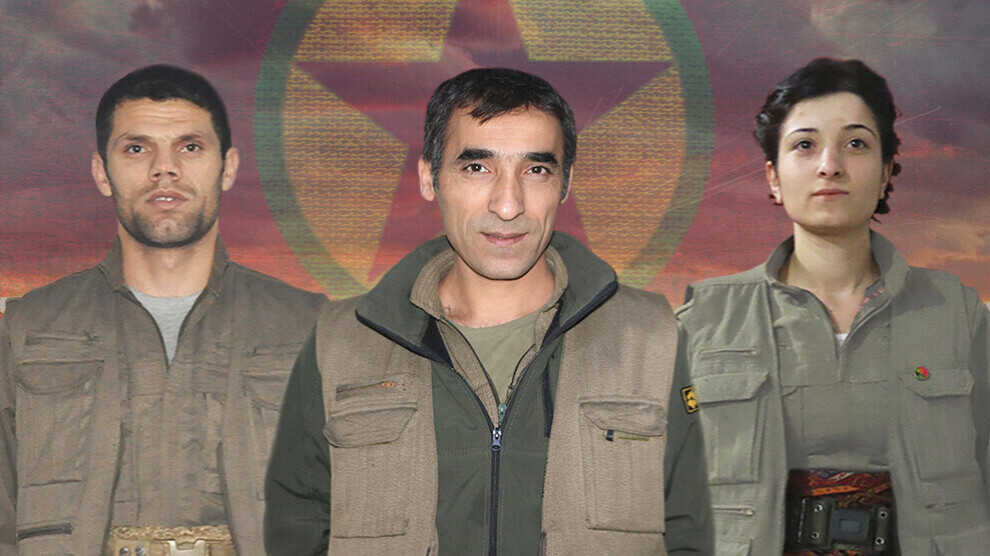HPG announces identities of three fighters who fell in April in Besta
The HPG press center announced the identities of three fighters who died in April in the northern Kurdish region of Besta.
The HPG press center announced the identities of three fighters who died in April in the northern Kurdish region of Besta.

The press center of the People's Defense Forces (HPG) announced that guerrilla commanders Koçer Didêrî, Berxwedan Amara and Dijwar Cizre fell on 25 April 2022 in the northern Kurdish region of Besta during a Turkish military operation.
 Codename: Koçer Didêrî
Codename: Koçer Didêrî
Name and Surname: Naim İlçin
Place of Birth: Elih
Mother and father’s name: Ayşe – Mehmet
Date and place of death: April 25, 2022 / Besta
 Codename: Berxwedan Amara
Codename: Berxwedan Amara
First and last name: Leyla İldeniz
Place of Birth: Izmir
Mother and father’s name: Nazdar – Faysal
Date and place of death: April 25, 2022 / Besta
 Codename: Dijwar Cizre
Codename: Dijwar Cizre
First and last name: Selim Uslu
Place of birth: Şirnex
Mother and father’s name: Nefiye – Mehmet
Date and place of death: April 25, 2022 / Besta
Koçer Didêrî
Koçer Didêrî was born in the village of Deştadarê (tr. Sırtköy) in Hezex (Idil) and belonged to the Didêrî tribe. His family, who lived as nomadic shepherds, were known for their political involvement in the region and had already been under pressure when the Turkish state tried to force the family to become paramilitary "village guards" in the 1990s. The family refused and were forced to flee. These experiences shaped Didêrî's childhood.
With the kidnapping and imprisonment of the Kurdish representative Abdullah Öcalan in 1999, the desire to join the guerrillas grew in Koçer Didêrî. Due to his youth, however, he was not allowed to do so. When he reached the necessary age in 2003, he joined the armed struggle for freedom together with his cousin. He quickly got used to life in the mountains. Although uneducated, he developed rapidly in the guerrillas and became deeply involved in the apoist paradigm. Didêrî was then deployed as a commander in various regions in the southern Kurdish Medya Defense Areas. From 2014 to 2016 he fought in Northern Kurdistan and took on important tasks before returning to the Medya Defense Areas, where he commanded and led many actions against the invading troops, but was also active in training. As part of the "Time for Freedom" offensive, he again went to North Kurdistan, this time to the Botan region.
Berxwedan Amara
Berxwedan Amara's family is from Van. However, she herself was born in Izmir. In Izmir, Berxwedan was exposed to the Turkish policy of assimilation.
She always looked for ways to resist. Her struggle led her to the Kurdish freedom movement and she took part in youth work without being intimidated by the prevailing repression. Eventually, she was arrested.
After her release from prison, she went to the mountains and took the name Berxwedan (Resistance). She was trained at a military academy to become a professional fighter and, after successful practice in the Medya defense zones, went to North Kurdistan as commander of the women's guerrilla YJA Star.
Dijwar Cizre
Dijwar Cizre came from Cizre. He grew up in a politically active family and was shaped by the patriotic culture in the city. Impressed by the guerrilla struggle and the thoughts of Abdullah Öcalan, he began working in the Kurdish youth movement at a young age. He engaged in self-defense and was involved in laying the foundations for the 2015-2016 Resistance for Democratic Autonomy. In the end, he found his work insufficient and joined the guerrillas in the Cudî region in 2014.
The communal life within the PKK made a great impression on him and he was always engaged in further education. He first fought in different regions of the Medya Defense Areas. With the restructuring of the guerrillas, he professionalized his military skills. Finally, he returned to Botan full of anger about the Turkish massacres in the northern Kurdish cities between 2015 and 2016.
The HPG declare: “Our comrades Koçer, Berxwedan and Dijwar are the representatives of our people’s ceaseless freedom struggle. They more than lived up to their responsibility by fighting as guerrilla fighters during this critical phase in Northern Kurdistan.”
The HPG express their condolences to the families of the fallen and to the entire Kurdish people.